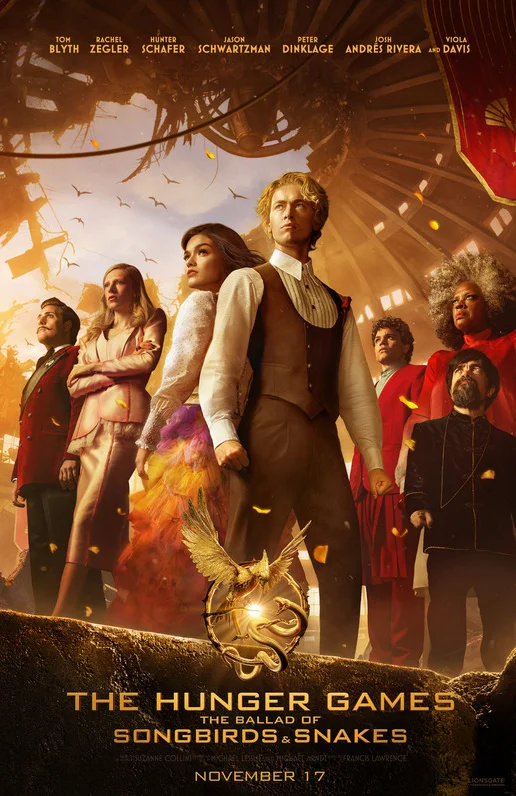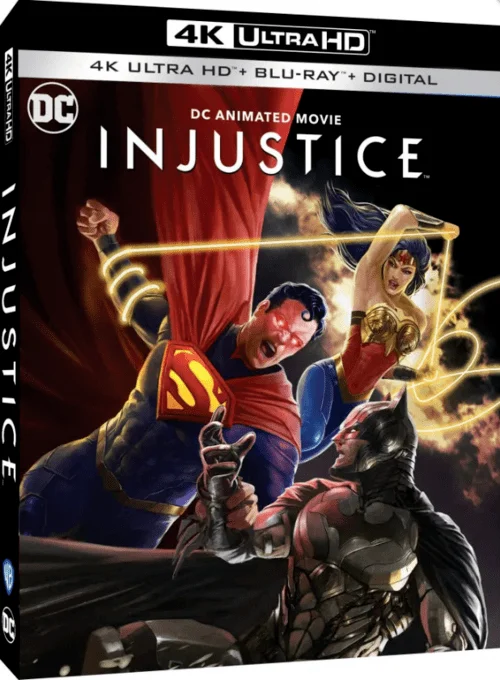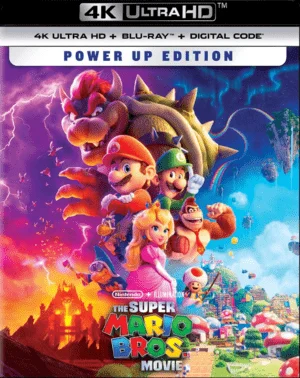
The Hunger Games: The Ballad of Songbirds & Snakes 4K 2023 2160p WEB-DL
Cast: Rachel Zegler, Tom Blyth, Viola Davis, Dexter Sol Ansell, Rosa Gotzler, Clemens Schick, Fionnula Flanagan, Hunter Schafer, Ashley Liao, Athena Strates, Joshua Kantara, Amélie Hoeferle, Kaitlyn Akinpelumi, Florian Burgkart, Ayomide Adegun, Aaron Finn Schultz, Max Raphael, Mekyas Mulugeta

A prequel to The Hunger Games. The action of the plot will unfold 64 years before the main series. Young Coriolanus Snow, the future dictator of Panem, becomes a mentor for Lucy Gray Baird, a participant of the Tenth Games from District 12. Romantic feelings gradually develop between them.
The Hunger Games: The Ballad of Songbirds & Snakes 4K Review
The future president of the country, Panem Coriolanus Snow, is an orphan, the son of a war hero, living in a dilapidated apartment in the capital with his grandmother and cousin Tigris. The only things in his closet are his father's school uniform and clothes, and a jar of broth in the refrigerator. Once the Snow family was one of the richest and most influential, but now Corio and Tigris can not pay for housing, and it will soon have to be sold to some nouveau riche from the province. The only chance to save the family's honor is a scholarship to the institute, which is promised to be given to the mentor of the winner of the 10th Hunger Games. Except Corio is given a female tribune from the poorest, coal-producing 12th district, Lucy Gray Baird. Hopes for a happy future seem to be gone, but the girl catches everyone's attention during the Harvest Ceremony by putting a sting by the mayor's daughter's scruff.
Decades later, the Capitol will be drenched in luxury, but now the city is recovering from the recent war, and mores are as harsh as ever. In the future, the tributes will be put up in a posh hotel, taught survival and martial arts for three days. Lucy Gray is much less fortunate: she and the other tributes are dumped in a zoo cage, left without medical care, food or water, and put on display for the amusement of the public. Corio realizes that he can't count on the girl to win the arena by force, so he starts behind-the-scenes political games. Thankfully, he has a way to influence the format of the games - the young man is interested in the Hunger Games manager Volumnia Gole.
In 2020, Susan Collins, who gave the world the major teen novel of the 2010s, The Hunger Games, released a prequel about the franchise's antagonist President Snow. Collins is not the first and not the last who decided to capitalize on the success of her work to make more money on the plot superstructure. The difference in the approach of the writer is that she does not want to justify the villain, but to continue the philosophical quest of "The Hunger Games". The heroine of the original trilogy, Kitniss Everdeen, for all her rebellious nature, is an idealized person in terrible circumstances (two battles in the gladiatorial arena and a war). Although Kitniss was a symbol of the revolutionary movement, she almost always ended up as a pawn in someone else's big game. In The Ballad of the Snakes and Songbirds, Snow is the steward of his life; through his development, Susan Collins explores the nature of the human soul, where darkness and light coexist.
The duality of Corio's soul and his relationship with Lucy Gray failed to be conveyed in the film adaptation. In the book he falls in love quickly, but does not trust Lucy and is jealous of everyone - in the movie everything is obvious. The problem is Rachel Segler's convex acting, suitable for a Broadway musical, but not for a less emotion-packed movie. All the work the true feelings of the girl must remain a mystery, Zegler needs to play on the undertones, be sly, not to give away the duplicity of nature. The flaw in the acting is especially evident in the speech, clearly giving away Lucy Gray's duplicity: she speaks to her friends from the 12th District with a pronounced southern accent, and in conversations with Corio from her speech for some reason disappear Texas notes. It's one of many examples of directorial sloppiness resulting from trying to fit 400 pages into 2.5 hours of screen spectacle.
Another difficulty with The Ballad of the Snakes and Songbirds is the paucity of action scenes. The tenth Hunger Games was one of the most boring in history, almost half of the tributes died before the battle even began. In the book, the author gives space to Corio's thoughts, his mental games, and his attempts to save his family's apartment. The movie's director Francis Lawrence (he also directed all parts of "The Hunger Games" except the first) sped up the pace of the narrative - it's a forced, stalemate decision that led to bad consequences. The intimate drama of growing up as a teenager in a totalitarian-capitalist society was relegated to the background, all the rhymes and references to the original trilogy became cringeworthy, and the images of the characters - poster. The latter is especially evident in the example of the Hunger Games manageress Dr. Volumnia Gole, who in Viola Davis' interpretation turned into the Disney villain Ursula. Lucky only a minor character, TV host Lucky Flickerman (Jason Schwartzman): in the book he was like a clown, in the movie - a comical but professional showman.
"The Hunger Games: The Ballad of the Snakes and Songbirds" - a movie, constantly rushing from one scene to the next, as if afraid that the viewer will get bored, tucked into his phone and write a negative review. Collins' work is not great at all, but the writer again managed to point out the most important problem of modern society. The society of rational capitalism subjugates man, promising success and all the benefits of the world, if he will play by the rules and condone the oppression of others. Let the future of Coriolanus Snow is predetermined, he will become a dictator and send children to bloody slaughter, Collins believes that humanity can change - her books are proof of that. Stories of grandiose events are less and less interested in people, it's time for silence and small heroes.
File size: 27.2 GB
Trailer The Hunger Games: The Ballad of Songbirds & Snakes 4K 2023 2160p WEB-DL
Latest added movies
Comments on the movie
Add a comment
 like
like do not like
do not like







